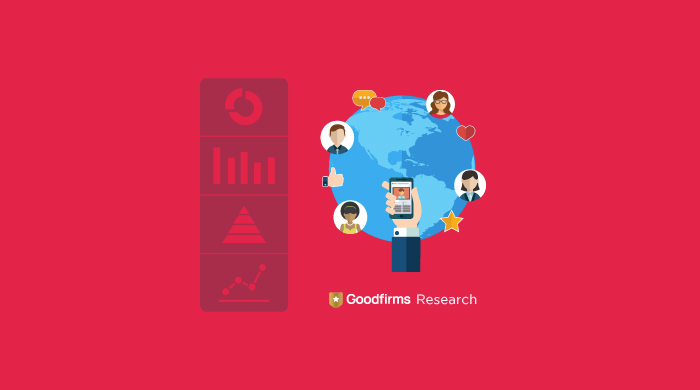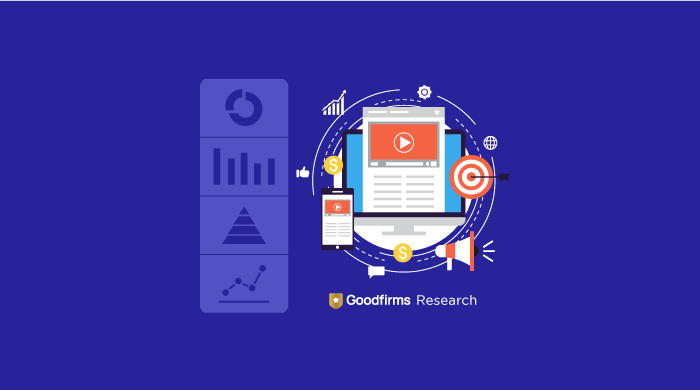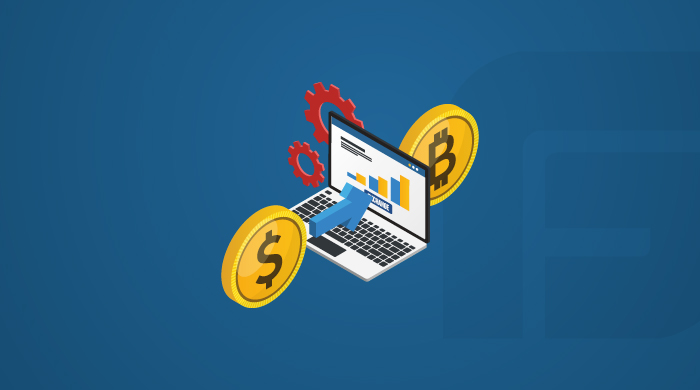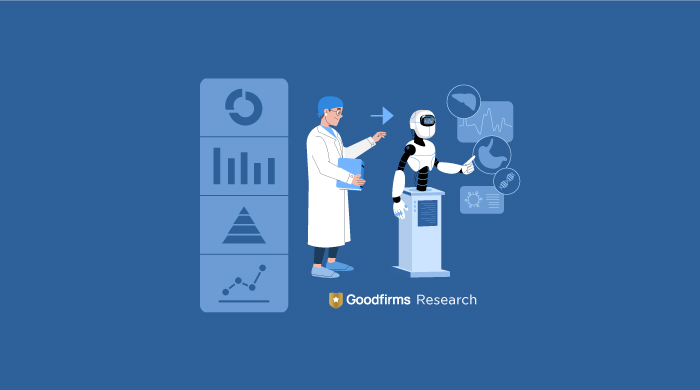Pay-Per-Click (a.k.a PPC) is a form of internet advertising to score traffic on a website. Rather than generating the leads organically, PPC is essentially buying leads to a website.
Online advertising is, seemingly, a driving revenue channel for the majority of search engines and social media. Over the years of the digital revolution, these industries have become imperative in the customer circles and subsequently tech-business biggies; with them, the online advertising evolved. Interestingly, PPC is occasionally compared to traditional print advertising; yet the process is much more complex than it used to be. Nonetheless, Pay-Per-Click has proved to be significant for businesses over the years given that the strategies and executions are placed properly.
Survey of Top Pay-Per-Click Companies
The survey was conducted among 200+ of PPC agencies plus experts from digital marketing backgrounds to derive the best practices, tips, and guides for PPC efforts. Though the research is conducted keeping in mind the industry needs of marketing professionals, businesses can also learn the ins and outs of PPC services to form a better marketing alliance with an outsourced company.
The participant companies not only helped to identify popular practices but also contributed at length, with industry-driven opinions and techniques. These companies aggregated global markets - representing their home markets from countries of Australia, Canada, Czech, India, Singapore, South Africa, UK, and the USA.
Following are the major participant agencies, that are on Goodfirms list of Top Digital Marketing Companies, who shared their extensive experiences and learnings of years by participating in this survey:
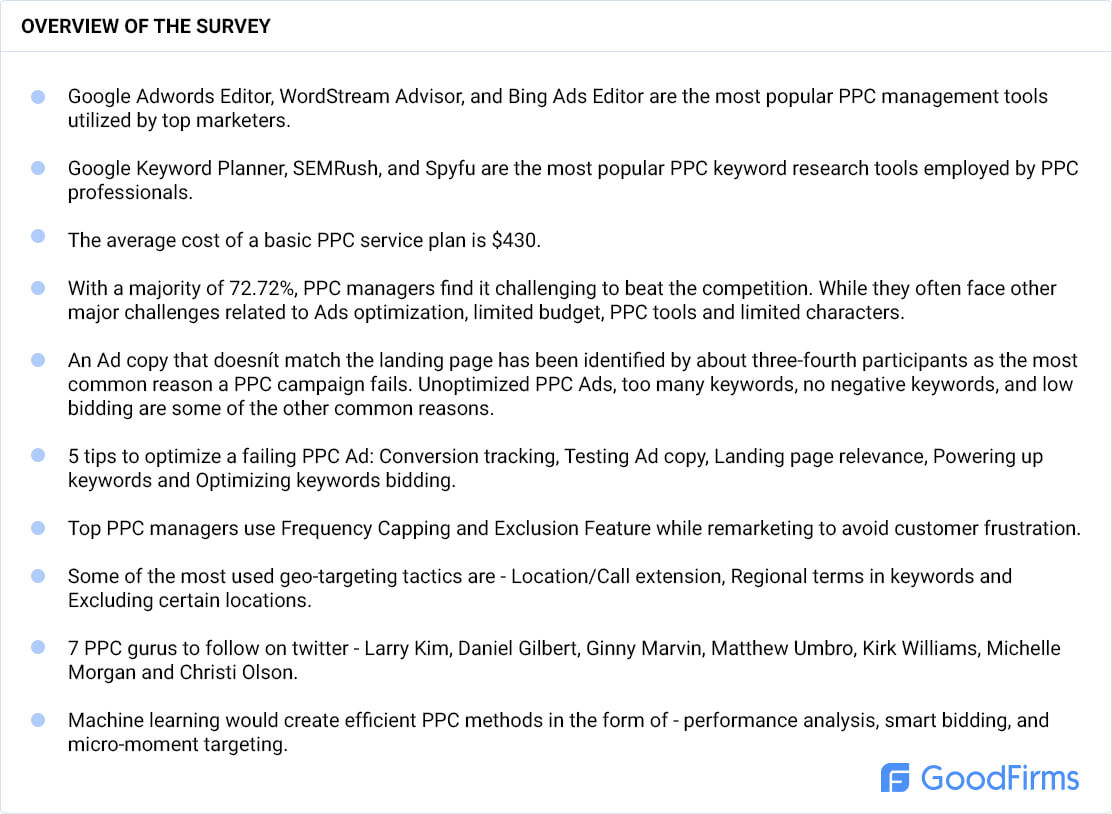
The Detailed Findings
The Pay-per-click model requires marketers to bid for ad placements on a search engine’s sponsored spaces when a user searches on a relevant keyword. Clicking on such ads takes the user to a designated landing page and costs businesses the bided fee. Yet, like any other marketing efforts, only a well-planned and polished execution would yield a profitable return on investment. While an unoptimized PPC campaign could dry your marketing budgets.
To help the agencies and businesses towards a rewarding PPC campaign, the present survey exhibits a derived understanding of major challenges, cost of PPC plans, popular PPC tools, common reasons for failures, PPC Ad optimization, remarketing techniques, effective geo-targeting tactics, popular PPC gurus, and the impact of machine learning on PPC industry. Following article is the detailed research by Goodfirms with supporting survey stats:
1. Most Popular PPC Tools
An apt PPC tool will save time being pivotal with market insights and strategy development, and eventually, profit for your business or your customers. With a variety of PPC tools available in the market, tools that help in ads management and keyword research are crucial. So with profound research, we asked PPC managers to handpick the best and most efficient among the popular tools. The stats are as below:
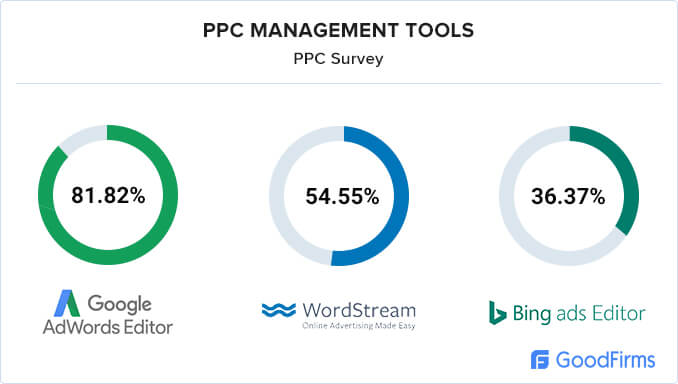
- A staggering 81.82% of digital marketers use Google AdWords Editor for managing PPC campaigns over multiple accounts in Google Ads.
- About 54.55% of internet marketers prefer WordStream Advisor for PPC consultancy and management.
- Surprisingly, 36.37% of the PPC agencies use Bing Ads Editor; which implies a solid marketing platform in the form of Yahoo! Bing Network ads.
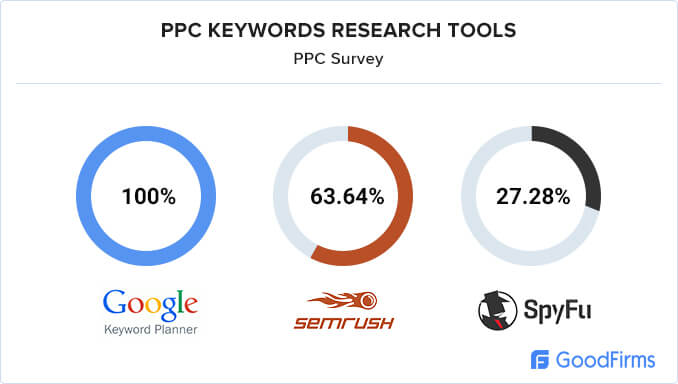
- Proving to be a staple for keyword research, Google Keyword Planner is used by a full 100% of the surveyed marketers.
- An all-in-one marketing analytics tool, SEMrush is employed by 63.64% of the PPC agencies.
- While the competitor research tool, SpyFu is used among 27.28% of the PPC companies.
2. How much basic PPC services cost?
Generally, plans for basic PPC services include keywords targeting, strategy development, Adwords account setup/management, Ad creation/optimization, Call-To-Action(CTA) optimization, monthly reports, and PPC consultancy. While premium service plans - including the creation/design of CTA, landing pages, and display banners as well as advance campaign monitoring - can be availed with extra charges.
As it engages a diverse amount of resources, PPC management doesn’t come cheap. Participant agencies implied that they charge anywhere from $150 to $1000 per month, depending on the service plans and models, besides the actual PPC spending. While on an average, clients pay $430 for employing these PPC management services. Based on PPC campaign budget and plan, there are several PPC pricing models employed in the industry; the most popular being - Percentage of Ad Spend and Flat Management Fee. A majority of the respondents prefer the earlier model as it is clear, dependable and based on growth. According to these market players, they charge around 7.5% to 15% of the ad spending from clients.
While many of the participant companies prefer to charge flat fees for its simplicity and transparency. Derived from the collected data, the following are the cost ranges for various PPC agencies:
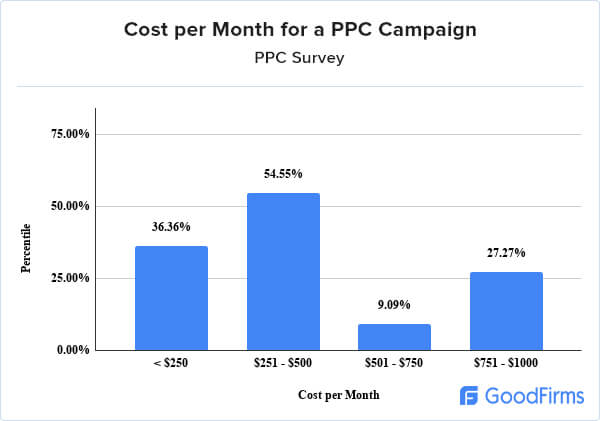
- About 36.36% of the surveyed PPC agencies charge under $250 for their basic service plans.
- With 54.55%, a majority of PPC agencies set a median charge range of $251 - $500 under which they provide basic as well as premium services.
- Only 9.09% of PPC companies offer their PPC services in a range of $501 - $750.
- Around 27.27% of these companies place themselves in a price category of $751 - $1000.
3. Major challenges for PPC Campaign Managers
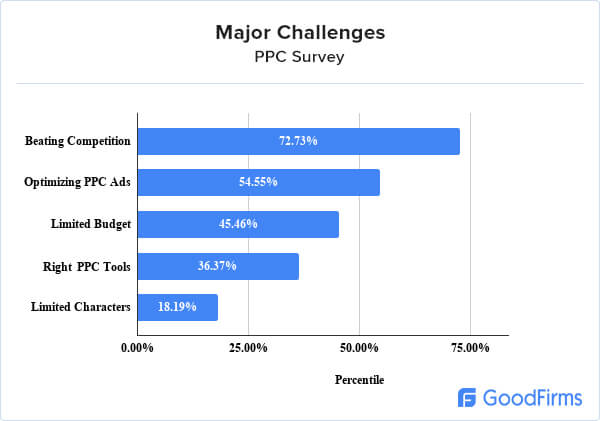
PPC allows anyone to set up their marketing agendas on the internet; this gives an equal hand to everyone to attract users in their own capacities. With such opportunities, 72.73% of the digital marketers often find it challenging to beat the competition. Bidding wars, trademarked keywords, and changing ad qualities are some of the fierce challenges offered by competitors.
Optimizing PPC Campaigns never stops. It’s one of the most tedious yet crucial parts of the process and thus 54.55% of the marketers feel that regularly optimizing PPC Ads is one of the major challenges. It includes constant support and maintenance of the campaign such as ad copy testing, new keywords, bid optimization, closing low-performing ads, adjusting the target audience, landing page testing and much more.
Around 45.46% of the surveyed PPC campaign managers agree that a limited budget for ad spending is a challenging task. A limited budget can hamper the most performing PPC campaign.
Driving an astounding PPC campaign can be a tedious and arduous, regardless of your experience and expertise. Fortunately, numerous tools are available to aid the process - yet 36.37% of the marketers feel challenging in picking up the right tool. Marketers expressed difficulty for ad testing, conversion tracking, and analytics related solutions.
Like any ad copy, PPC ads should be appealing enough to grab user attention and conversion. Typically, Google AdWords offers a 30-character limit with 3 headings and a 90-character limit with 2 descriptions for any ads; and a similar character limit for other popular platforms. Around 18.19% of the surveyed advertisers find conveying business offerings in limited characters.
4. 5 common reasons a PPC campaign fails
Numerous marketers burn through a large number of dollars consistently on PPC campaigns. Yet, they fail to acquire the desired market share - mostly because of simple mistakes that keep them from procuring a decent ROI on their Ad spend. The participant agencies identified the following simple mistakes:
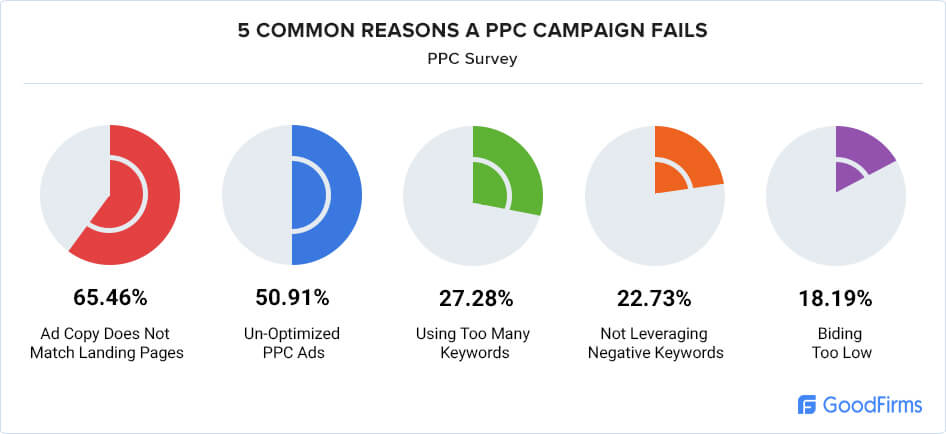
Ideally, a landing page must be particular about the product/service which has been mentioned in the Ad. Failing which, within ten seconds, a customer tends to leave the page - which badly affects the conversion ratio as well as waste the pay-per-click spending. Around three-fourths of the surveyed agencies identified that an Ad copy that doesn’t match the landing page is the most common reason for a PPC campaign failure.
As mentioned earlier, optimizing PPC campaign is one of the major challenges yet the most intricate one. About half of the marketers mentioned that ads fail due to un-optimized PPC ads. Being a vast operation to conduct, it becomes cumbersome for teams to work upon efficiently.
A little over one-third of the industry players have expressed that using too many keywords clearly doesn’t help, and could drain the Ad spending. As the experts have theorized, that majority of the lead is generated from a minority of keywords. Using and bidding on multiple keywords beyond a limit gets defocused over an audience which might not be potential, the worse is you have to pay for it.
A little below one-third of the ace marketers dug out one of the major reasons for poor conversion rate - not leveraging negative keywords. While many managers focus on long tail keywords, but this increases the risk of negative exposure or showing up to an untargeted audience. Marketers argue that using negative keywords could further sharp the targeted audience, increase conversion rate, and drive the sales.
It has been said enough, yet around a fifth of the surveyed PPC campaign managers feel that bidding too low is still one of the driving forces for marketing failure. It’s intuitive to bid low, but that might just result in a poor click-through-rate which would negatively affect the ad rank.
5. PPC Optimization: 5 tips for failing ads
PPC campaign is a dynamic task and it becomes even more decisive when the Ads are not generating desired outcomes. To aid professionals in such conditions, industry performers were asked to share the insights. Below are the tips they suggested:
#Conversion Tracking
Appropriate tracking of conversions is a standout amongst the most vital parts of any PPC campaign. In a situation, when you don't have exact analytics of your ad, you won't know which keywords are driving conversion rates and which are just consuming your budget. Also, the stats obtained are resourceful to edit the ads or even rechannel the campaign.
#Testing Ad Copy
The Ad copy is the primary platform for contact between you and your potentials. To optimize the failing Ads, PPC managers advice to regularly conduct A/B testing on different copies making ads more relevant; with varying headlines, description, link, keyword, and Ad Extension.
#Landing Pages Relevancy
Ad Copy and Landing Page are linked to one another. It's essential to create an Ad keeping in mind the selling point on the landing page as well as to feature the advantages, highlights, and the USP in your landing page that has been specified on the Ad.
#Powering Up Keywords
PPC optimization becomes a dynamic task because of this factor. Ads having high QS keywords would perform and thus much of the campaign success is bid on keywords. According to experts, it’s simple as a four-step guide - focus on high-performing keywords, replace low-performing keywords with the new ones, and utilize negative keywords.
#Optimizing Keyword Bidding
The next step is to optimize your keywords bid so as to beat the competition. According to Google’s Profit Driven Marketer, bidders should focus on profit, not efficiency. The argument holds that preference for an efficiency of each transaction would cost a profit from the total volume.
6. Remarketing Techniques: So as not to frustrate people
Primarily, remarketing strategies deal with jotting down users who have visited your website and are interested in the products/services offered, done by creative placement of cookies. These are the people who can be easily converted compared to those who haven't yet visited your website. Needless to say, this does not imply that you get the privilege to exploit the opportunity and be frustrating to the point that you make your prospects disgust your ads just because they have been tossed on their display networks too many times. Industry experts have acclaimed the following corrective remarketing techniques:
#Frequency Capping
Often this annoyance implies that professionals haven't put limits on how frequently ads show up on the websites visited by the potentials who have visited their site. Almost every surveyed PPC manager pointed out the integral use of frequency capping in their remarketing techniques. Remarketing to potentials can also be done without annoying them just by ensuring that the ads are shown in a specific number of times for every day or week.
#Audience Exclusion
Some more marketers pointed out it would be in the best practice to exclude certain audiences. Excluding converted audience is one such way - as it would cut down ad spendings with saving you from customer frustration. This lot is ideal for upselling, cross-selling, or even a further push into sales funnel and a separate campaign can be launched for them.
Many creative marketers use the feature to re-target losing customers, based on the sales cycle, to re-engage with better offers. This practice is popular with subscription-based or freemium service providers.
7. What are the highly effective tactics for Geo-Targeting?
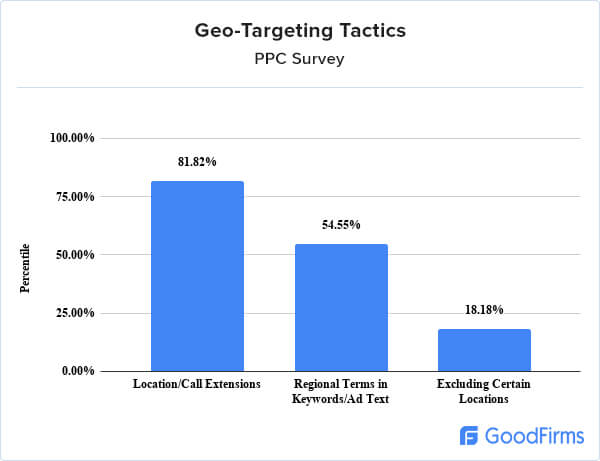
For most of the brick and mortar shops, getting a person into a shop or even into a conversation is crucial for sales-through rates. For this, a towering 81.82% of the marketers recommend adding location/call extensions to their clients for local PPC campaigns. Search engines display a direct button for address and phone number to engage users; thus significantly increasing the click-through rates. Not only this, extensions help your business stand out among others as it hyper-target the online prospects to the block number of your local shop.
With all the audience targeting options available, Keywords are still the fundamental driving force of PPC campaigns. And thus, 54.55% of the PPC managers employ regional terms in keywords and ad text to empower the geo-targeting. Enriching keywords with local names, languages and even slangs on ads as well as landing pages not only sharpens local reach but also increases the chances of ads display at a relevant location.
About 18.18% of the PPC managers exclude certain locations to funnel down ads campaign. Primarily locations, where service/product is not available or feasible, can be excluded to structure a geo-targeted audience. Or in the case of cultural diversity, separate location-targeted ads campaign can be launched.
8. 7 PPC Gurus to follow on Twitter
The best way to know the latest happening in the PPC world is to follow those which are its Gurus, particularly with regards to methodologies and tools being utilized by these PPC specialists. These Gurus are practically curating the best content by tweeting and retweeting their favorite resource, circulating in the online advertising space. Following are some of the most popular PPC Gurus:







9. AI and Machine Learning for PPC
One of the industries in which machine learning have demonstrated extraordinary potential is Digital Marketing, particularly Pay-Per-Click advertising. In spite of the fact that the current algorithms and procedures of AI still can't reach the meticulousness of scanning, planning, and optimization by human PPC groups, the current type of PPC automation tool plays out a decent arrangement of errands that make PPC marketing quicker, less demanding, and more proficient.
With machines learning from the data, it is a win-win case for professionals who would be spared of toiling through zillions of data while AI getting powered and efficient. Following are some of the ways, among many others, experts envision machine learning to empower PPC marketing:
#Efficient Performance Analysis
One of the most essential ways machine learning enhances PPC marketing is through more efficient performance analysis. Machine learning can perform complex examinations of strategies and executions in a way that is adaptable and proficient. It can also generate performance metrics that a business can naturally and precisely apply. They can utilize this information to anticipate conversion ratios or click-through-rates of future PPC campaigns.
#Smart Bidding
Machine learning can deftly assess user behavior patterns, industry insights, and past searches to spot valuable keywords. With such hefty data aiding to procure insights, AI-powered smart bidding can actualize an optimized strategy that can make use of several performance metrics such as click-through rates, cost per click, cost per acquisition and conversion rates.
#Micro-Moment Targeting
The Google hailed model of micro-moment marketing suggests businesses be there, be useful and be accountable to rake in the consumer intent-driven opportunities. Combined with AI, this becomes a really exciting feature as this can guide PPC campaigns to a specific audience who are readier to purchase your products and stray far from those who probably won't be the best potentials.
Conclusion
Currently, Pay-per-click offers the single best solution for advertising on popular search engines and social media. With the power of virtual platforms, PPC will not only reach targeted masses but also bring in customers. Though who gets the chance to show up on the search pages depends chiefly on advertiser’s Ad Rank - which drives all the efforts of the PPC teams.
For businesses who now have a better understanding of the PPC industry, Goodfirms offers you a list of top PPC Companies to help you partner the best agency your marketing needs deserve. Within the list, you would get insights into the company with useful client reviews and project details.





